Supports Cross Border Professionals and Families

Many taxpayers need to pay attention to the FBAR. The U.S. is a melting pot, with many mixed-nationality married couples. In this article, I explain in plain language what the FBAR rules are.
If you have foreign financial accounts with an aggregate value of accounts exceeding $10,000 at any time during the calendar year, you must file FBAR. In other words, the dollar threshold does not apply to each account balance. It applies to the entire accounts. In addition, the balance is not at the end of the year. You must report at any time of the year if the total value exceeds $10,000. You have two accounts at $6,000 and $5,000, respectively; you must file an FBAR.
The due date for FBAR filing is April 15 of the following year. If you fail to file by April 15, you have an automatic filing extension until October 15. You do not have to act because this is an automatic extension.
You must file FBAR online. https://www.fincen.gov/report-foreign-bank-and-financial-accounts
You must have the financial institution name, account number, the maximum balance of the year, address of the financial institution where you hold your account. Using the year-end exchange rate when translating your foreign currency to U.S. dollars would be best. You can find the rates on the following site. https://fiscaldata.treasury.gov/datasets/treasury-reporting-rates-exchange/treasury-reporting-rates-of-exchange
Financial accounts include bank accounts, investment (brokerage) accounts, cash value of foreign life insurance, foreign corporate (private) pension accounts; foreign bank accounts with signatory authority, and others. Foreign means geographical location outside the U.S.
Penalties of FBAR include a potential criminal charge, a monetary fine of greater than $100,000 or 50% of the account’s value (willful violation), or $10,000 per violation (non-willful violation).
I recommend you act quickly when you find your issue. The IRS considers how swiftly you act as one of the key factors. Please contact a professional on a timely basis. In addition, your history of tax compliance with the IRS is another key factor. Taking a conservative approach in FBAR reporting is also recommended. I recommend registering the account if you are still determining whether you should report. Overreporting should not hurt you.
CDH provides tax return preparation and tax consulting services for cross-border individuals living in the United States or foreign countries and strives every day to solve and explain various problems and questions of these people. In addition, the issues these people face are complex and wide-ranging, including the tax laws of your country and the United States, immigration law, life insurance, and retirement rules. This article makes complex tax laws and regulations easy to understand, which is just the point. Therefore, there are many exceptions. There is also a risk that the rules have already changed by reading them. Please get in touch with us from the following website for the latest practices. Also, consult with tax and legal affairs experts if you take action.
CDH Resources: www.cdhcpa.com. We provide one-hour paid consultation sessions online. https://outlook.office365.com/owa/calendar/[email protected]/bookings/ If you can read Japanese, visit https://www.cdhcpa.com/ja/cross-border-individual-tax/. You can access them all on the page. YouTube, FaceBook, free online consultations, estate, permanent resident waiver, exit tax, Form 1040, tax simulation, overseas asset reporting, other sectoral online question forms, and monthly newsletter sign-ups. For more information-packed past articles, check out https://www.cdhcpa.com/ja/news/. Please feel free to use it. You can email me at [email protected]
